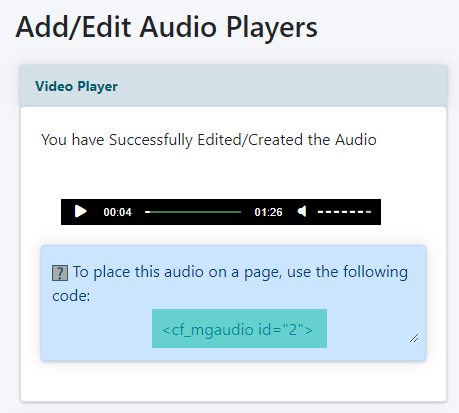Tutorial
Audio files can be embedded on your content, department or portal pages using the built in audio player. The audio player has a responsive design option so it will adjust to the screen size on any desktop or mobile device. A user will be able to listen to the embedded audio file directly from your pages.
The audio player will play .mp3 files.
Here is an example of an embedded audio player:
To Embed an Audio File:
Click each section to expand for more information:
The Audio Players can be found under Multimedia Audio Players
Choose 'Add New Audio Player' from the drop down menu and click the button.
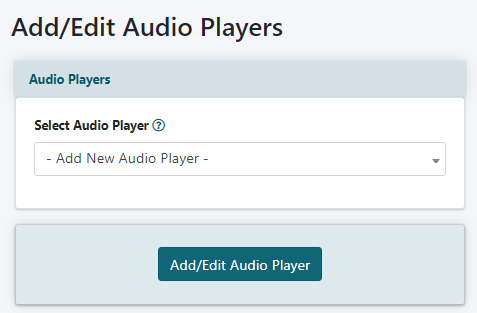
Audio Player
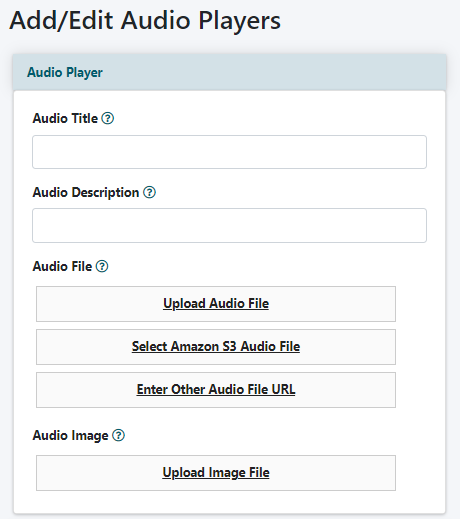
Audio Title
Enter a Title for the audio
Audio Description
Enter a Brief Description for the audio
Audio File
There are three different ways to select the audio file that can be played in this player.
Upload Audio Option
If uploading the file directly to the site, click Upload Audio File and select the file from your local drive.
Select Amazon S3 Audio File
To select the file from your Amazon S3 Account choose the Select Amazon S3 Audio File link. Visit the tutorial on using Amazon S3 to upload your files for more instruction if necessary.
Enter Other Audio File URL
To use an audio file hosted at another third party solution, click Enter Other Audio URL and enter the full URL of the audio in the box. Visit the tutorial on using files hosted from a third party for more instruction if necessary.
Audio Image
Click on Upload Image File and select an image from your local drive. This image will appear as the static image for the audio player.
For best results, the image dimensions should equal the player dimensions.
Settings
Click on the Settings box to open the section.
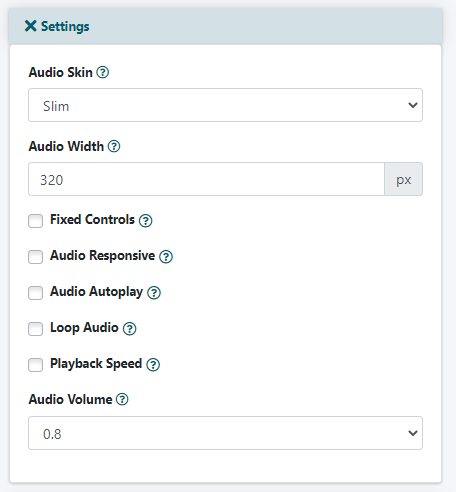
Audio Skin
Set the type of Audio Skin for the Player from the drop down menu. The drop down options are slim, fat, full or button.
Audio Width
Add an Audio Width for the audio player. This will be the maximum width for the player. It will automatically adjust on smaller screen sizes.
Fixed Controls
Check the box for 'Fixed Controls' to always display the player's controls. If the 'Fixed Controls' is left unchecked, the bottom controls will only show when the user hovers over the audio player.
*If there is not an image uploaded, the controls will always show.
Audio Responsive
Check the box for 'responsive' if you would like the player to always fill the width of the user's full screen. Uncheck this box if the player will have a max width set in the Audio Width field.
Audio Autoplay
Check the box to set the audio so that it automatically begins playing upon loading. Leave the box unchecked when you would like the user to manually click the play button to begin watching.
Loop Audio
At the end of the audio it will automatically begin playing from the start. If this is the desired behavior, check the 'Loop Audio' box.
Playback Speed
Check this box to provide a control for the user to control the speed of the audio.
Audio Volume
Choose the initial volume setting for the audio from the drop down box. The user can manually adjust the volume in the controls if necessary.
Styling
Click on the Styling box to open the section.
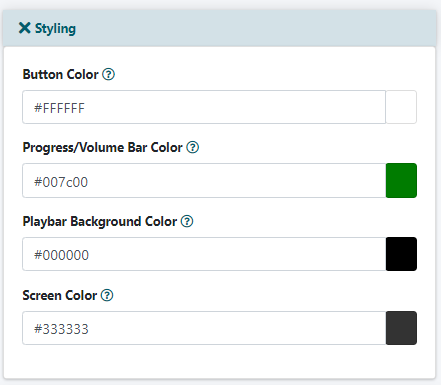

Button Color
Set the Color for the buttons on the control bar. Click in the box and enter the hexadecimal color if known, or click in the color box to choose a color.
Progress/Volume Bar Color
Set the color for the volume and progress bars on the player. Click in the box and enter the hexadecimal color if known, or click in the color box to choose a color.
Playbar Background Color
Set the color for the color behind the volume and progress bars. Click in the first box and enter the hexadecimal color if known, or click in the color box to choose a color.
Screen Color
Set the color for the background of the audio. Click in the box and enter the hexadecimal color if known, or click in the color box to choose a color.
Action Events
A script can be input to run after a specific set time.
Click on the Actions box to open the section.
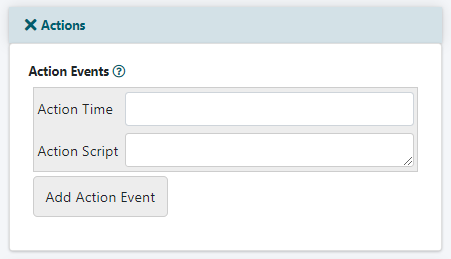
Action Time
Enter the amount of time in seconds. This is the time after the audio has been started when the script will run.
Actions Script
Add the script into the actions script box.
Add Additional Scripts
Click on the button and repeat the two steps above.
Click the button.
Add the Audio Player to a Page
After the audio has been saved, a preview screen with the audio will appear.
The CF Tag will appear in the box below the audio. Copy the cftag and paste it into the content box for a page, department or portal page.
